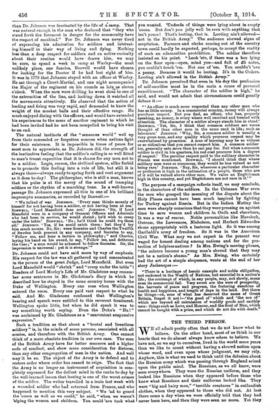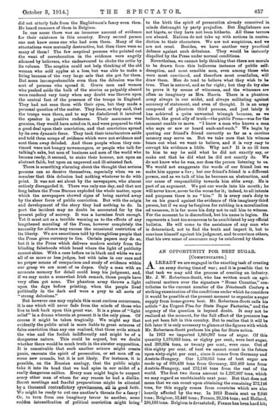THE THIRD PERSON.
WE all admit pretty often that we do not know what to believe. On the other band, most of us think in our hearts that we do almost always know whom to believe. We have not, so we say to ourselves, lived in the world more years than we like to count without having a shrewd notion upon whose word, and even upon whose judgment, we may rely. Anyhow, this is what we used to think until the delusion about the Russian army which was passing through England seized upon the public mind. The Russians, as we all know, were seen everywhere. They wore the Russian uniform, and they looked like Russians when they appeared before those who knew what Russians and their uniforms looked like. They were "big and hairy men," "terrible creatures" in outlandish clothes, when they appeared to those who did not. At last there came a day when we were officially told that they had never been here, and then they were seen no more. Yet they
did not utterly fade from the Englishman's fancy even then. He heard rumours of them in Belgium.
In one sense there was an immense amount of evidence for their existence in this country. Every second person one met knew some one who had seen them. Many of the attestations were mutually destructive, but then there were so many of them! The few sceptical persons who pointed out the want of corroboration in the evidence were angrily silenced by believers, who endeavoured to choke the critic by its volume. The sceptics could not help thinking of the old woman who sold apples at a loss, but was able to make a living because of the very large sale that she got for them. But more incomprehensible even than the delusion was the sort of persons who spread it. Grave men and women who pushed aside the bulk of the stories as palpably absurd were rendered very testy when any doubt was thrown upon the central fact of the presence of the troops in England. They had not seen them with their eyes, but they made a personal question of the matter. They knew, so they said, that the troops were there, and to say he disbelieved it involved the speaker in positive rudeness. Their assurance was genuine, they would have acted on it, and were prepared to risk a good deal upon their conviction, and that conviction spread by its own dynamic force. They took their interlocutors aside and told them scraps of evidence which were not evidence and sent them away deluded. And these people whom they con- vinced were not hungry newsmongers, or people who talk for talking's sake, but men of business and men of the world who became ready, it seemed, to stake their honour, not upon an abstract faith, but upon an unproved and ill-attested fact.
There is something alarming about the thought that serious persons can so deceive themselves, especially when we re- member that this delusion had nothing whatever to do with print. It was not set about by the newspapers, who almost entirely disregarded it. There was only one day, and that not long before the Press Bureau exploded the whole matter, upon which the newspapers showed signs of being carried away by the sheer force of public conviction. But with the origin and development of the story they had nothing to do. In part the incident may no doubt be accounted for by the present policy of secrecy. It was a harmless fruit enough. Yet it must act as a terrible warning as to the effects of any lengthened muzzling of the Press, however completely the necessity for silence may excuse the occasional restriction of its liberty. We are sometimes told by thoughtless people that the Press gives currency to lies. Certain papers may do so, but it is the Press which delivers modern society from the blinding falsehoods which breed where the light of publicity cannot shine. With a case before us in black and white we are all of us more or less judges, but with tales in our ears and no proper means of comparison and study of evidence within our grasp we are most of us dupes. Only a man with an accurate memory for detail could keep his judgment, and, if we may make a somewhat Irish remark, those people have very often got none. The phantom army throws a light upon the days before printing, when the people lived politically in the dark and were a prey to all sorts of " strong delusions."
But however one may explain this most curious occurrence, it is one which will never fade from the minds of those who live to look back upon this great war. It is a piece of "light relief " in a drama wherein at present it is the only piece. Of course it might be taken tragically. We might say that evidently the public mind is more liable to great seizures of false conviction than any one realized, that these evils attack the wise and the foolish indifferently and might be of a dangerous nature. This could be argued, but we doubt whether there would be much truth in the sinister supposition. It is conceivable that such another seizure might create panic, recreate the spirit of persecution, or set men off on some new crusade, but it is not likely. For instance, it is possible, on the Russian analogy, that the public might take it into its bead that we had spies in our midst of a really dangerous calibre. Every man might begin to suspect every other man of whom for any reason he had a dislike.
Secret meetings and fearful preparations might be attested
by a thousand contradictory eyewitnesses, all in good faith. We might be ready to cut one another's throats for a fancy !
Or, to turn from one imaginary terror to another, some sudden intensification of political conviction might bring to the birth the spirit of persecution already conceived in minds distraught by party prejudice. But Englishmen are not bigots, or they have not been hitherto. All these terrors are absurd. Nations do not take up with notions in contra- diction to their characters. We are not auspicious, and we are not cruel. Besides, we have another very practical defence against such delusions. They would be instantly dispelled by the Press under normal conditions.
Nevertheless, we cannot help thinking that there are morals to be drawn from this ludicrous instance of publio self- deception, and most sensible men, even among those who were most convinced, and therefore most crestfallen, will draw them. Men do tend to believe what they wish to be true. That is natural, and so far right ; but they do try also to prove it by means of witnesses, and the witnesses are often as imaginary as Mrs. Harris. There is a phantom army always in our midst, and always militating against accuracy of statement, and even of thought. It is an army composed of phantom third persons, and just lately it has achieved a quite unwonted triumph because, as we believe, the great ally of truth—the public Press—was for the moment unable to move. " I know a man who knows a man who says or saw or heard such-and-such." We begin by quoting our friend's friend correctly so far as a careless memory may serve us. But we take care that his witness bears out what we want to believe, and it is very easy to corrupt his evidence a little. Why not P It is no ill turn to him to say he said what he did not exactly say, or make out that he did what he did not exactly do. We do not know who he was, nor does the person listening to us. We would not exaggerate the words of our friend lest we make him appear a liar ; but our friend's friend is a different person, and as we talk of him he becomes an abstraction, and our sense of responsibility towards him ebbs away. He is part of an argument. We put our words into his month; he will never know, never be the worse for it; indeed, to all intents and purposes there is no " him." It is every one's duty to be on his guard against the evidence of this imaginary third person, but if we may be forgiven for rubbing in a moralization ad nauseam, it is far more his duty not to call him to witness. For the moment he is discredited, but his name is legion. He represents a host too numerous to be annihilated by any official bulletin. He will come to the assistance of any man who is determined, not to find the truth and impart it, but to convince himself against his judgment, and to convince others, that his own sense of assurance may be reinforced by theirs.











































 Previous page
Previous page